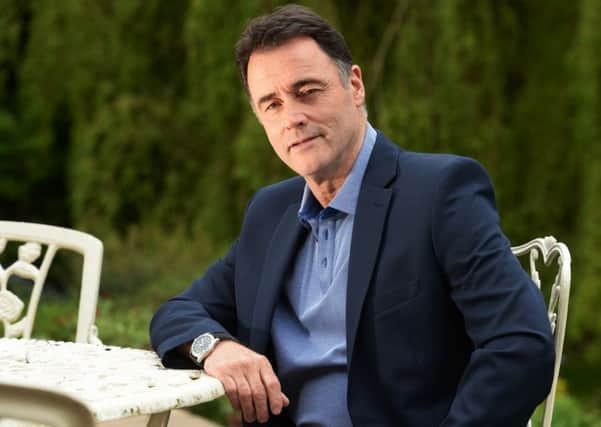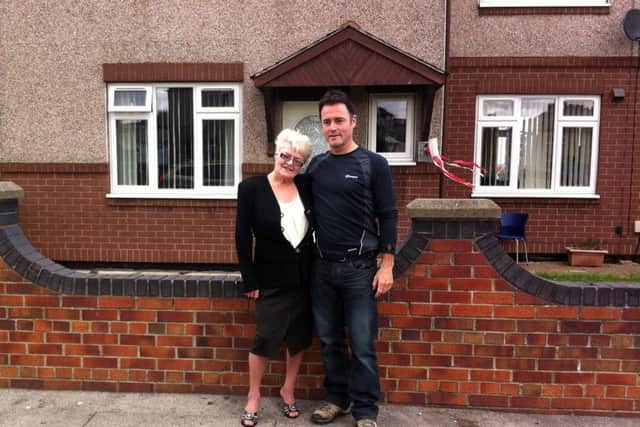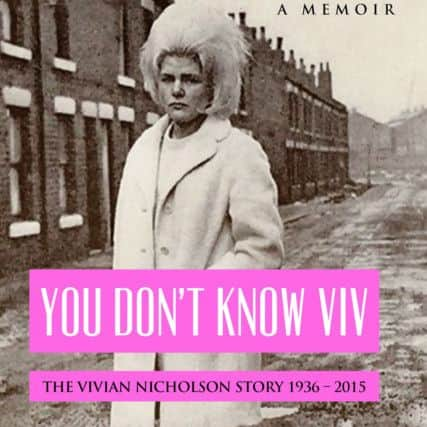Spending time with Viv: Son Howard Nicholson says the last half of her life was as turbulent as the first


Howard Nicholson is offering me £20m. There’s just one condition. He says it will make me unhappy. In fact, he guarantees it. And then he asks: “Assuming you know that, will you still take it?”
It’s a hypothetical question, posed as I interview him in his kitchen at his house in Horsforth. The youngest son of Viv Nicholson, the 56-year-old married father-of-three, jumps in with the answer. “Almost everyone would say yes but that they would be sensible with the money, that they wouldn’t let it change them, but they will just buy this nice house and a new car and clothes and so on. Before you know it, people are looking at you differently and that’s what happened to my mum.”
Advertisement
Hide AdAdvertisement
Hide AdHoward is speaking some two years after the death of his mother, whom he said led a turbulent life but of whom he says most people have the wrong impression. In a bid to redress the balance, he’s penned a new book, You Don’t Know Viv, which chronicles her life, including the last 38 years of her life, which, he says, were just as eventful as the first 40.


“The book came out on anniversary of her death on April 11, 2015. It was one of her dying wishes I write a book, so people would know the real Viv. At the time, she was suffering from dementia. As it got progressively worse, I took [the book] more seriously.”
Viv Nicholson was the rags-to-riches story par excellence after she and her husband, Keith, won the Pools in 1961, scooping just over £150,000, a relative fortune at the time and equivalent to about £3.5m today. Although it was Keith who bought the ticket, attention focused on Viv, who when asked what she would do with the money, declared they would “spend, spend, spend”. It was a catchphrase which captured the imagination of the public but was, as Howard explains, both a blessing and a curse.
“No-one can deny having money takes away certain problems but it’s also like opening Pandora’s Box. That’s what happened to her. Winning the money was compounded by the fact she came from such poverty. As she changed,her true friends retracted and other people came into the mix. She was holding a lot of parties, there were some good times, don’t get me wrong.”
Advertisement
Hide AdAdvertisement
Hide AdFor Howard, however, the youngest of Viv’s four children, the wild lifestyle was glimpsed in snatches. At just three-and-a-half he was sent to boarding school, where he remained until 14, returning home every two weeks. Around the same time, his father, Keith, died in a road accident.


Howard recalls: “He was on his way to Wetherby to buy some ponies when he was killed.” His untimely death at just 27 marked the beginning of the end for the fairytale. After his death, Viv lost most of the remaining money to the taxman but by that time she had a penchant for the finer things in life.
That life, from the grime and grit of a West Yorkshire mining town to a world where anything was possible, was the subject of a successful stage play, Spend, Spend, Spend, which premiered at West Yorkshire Playhouse in 1998.
Now Howard says he is keen to tell the story of his mother’s life after 40.
Advertisement
Hide AdAdvertisement
Hide Ad“Spend, Spend, Spend takes the story up to the fifth husband but after that there was nearly another 40 years, which was far more incredible than the first 40. What people don’t realise is she won another fortune. She lost the first lot of money but then she gained another, with proceeds from the musical and the book about her life. I don’t want to give too much away but there are lots of stories to tell.”


One of those involves her shinning down a drainpipe in a ‘Great Escape’-style break-out from a carehome, not that remarkable in itself until you realise she was well into her 70s and her room was on the second storey.
“There was another time I got a phone call,” recalls Howard. “It was from the carehome and they just said, your mother’s drunk. She’s paralytic. Not only that, she’s got the rest of the carehome paralytic. And worse, she’s given them all chocolate. Somehow, she’d stumbled on a Christmas hamper and she’d decided to open it.”
Behind the scenes, Viv was generous to a fault, often giving vast sums of money away, while scrimping by with very little for herself.
Advertisement
Hide AdAdvertisement
Hide Ad“People didn’t see the real Viv. The media told you one thing but there was another woman behind that. When she died, Hollywood got in touch with me about the possibility of doing a film…. Kate Winslet’s name was mentioned. I went to see them. They were going to start it in a hospital with her dying and then bring it back full circle… I asked them how they were going to end it, because I was eager that they show the real Viv.


“When the West End Musical went on tour and then she had a book out, which was successful, so she began again to begin to get some money… I did wonder whether she might be more sensible but she ended up spending it all. In a way she was very isolated.”
But despite her money worries, Viv would actively seek out people in need in order to help them financially. She would give to charity and individuals. On one occasion, she walked into a cafe in Castleford and bought everyone a breakfast, something Howard said was typical of her. For Howard, writing the book has been cathartic.
At 14, he was expelled from boarding school, meaning he had to complete the remaining year of his schooling at Castleford High, which contrasted sharply in terms of pupil discipline.
Advertisement
Hide AdAdvertisement
Hide AdWhen he left there, he moved to London to find work in advertising but ended up back in Leeds after being made redundant. He set up his own cleaning business aged 27 and, on a whim, decided to become a landlord - the move paid off and he now manages a number of properties.
He recalls: “Being at boarding school protected us from the chaos that was going on in mum’s life… when you go to boarding school at three-and-a-half you know nothing else.
“Some people have said this was to get us out of the way but in a sense it was a protection for us to give us a chance of escaping the traditional life associated with Castleford, which was you left school and went down the pit.
“When I see the musical and I see my mother’s life, that really upsets me, even now, it’s a strange thing to sit and watch with your family. That’s why when I started writing the book, I cried for months, I had to put it down and come back to it.
Advertisement
Hide AdAdvertisement
Hide Ad“My mother had this rags to super riches story and had ultimate love and then lost it. She had a lot of problems in life. Her father was an alcohol, she had problems with drink herself. When she got to the age of 40 and she had lost all the money and everything, she was on a suicide mission but then something miraculous happened which turned her whole life around and she found true happiness. But she was always looking to help people and in a way I hope this book does that.”
When Viv’s entire estate was left to Howard but as he explains: “It was everything of nothing. There was no money left.”